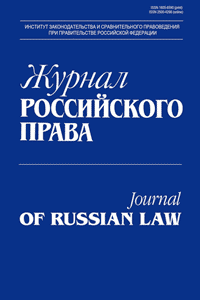Foreign law can be an important object of informational legal relations. Different states compose unified registers of legislative acts. In the long run creation of national information resources on the basis of the current legislation contributes to interpenetration of legal norms into foreign legal systems. In the age of globalization cooperation between states on a contractual basis opens large-scale prospects for establishing business and other contacts between citizens and legal entities of different state affiliations. But the use of this method of law unification faces difficulties related to implementation of the international treaties’ norms into the national legal system. Also difficulties stem from the fact that after implementation into the national legal system international treaties’ norms do not have a uniform interpretation. Due to the existence of the problems in unification of law through international treaties other ways of unification of law of various states are being explored. Diffusion in law, based on the penetration of foreign law norms into the national legal system is one of such ways. The way of diffusion in law envisages the application of unified categories of institutes and legal rules enacted in this or that state as the most efficient legal norms, institutes. This way of unification of law gains more and more recognition due to the fact that it does not face the problems characteristic for unification of law through international-treaties, but accomplishes the same goals Tire ensures harmonious interaction between various legal systems in law.
Information law, private international law, unification and harmonization of law, characterization and diffusion of law, the Bustamante Code, principles of the law, information technologies, systematization of legislation, registries of normative acts.
1. Alvarez A. Le droit international americain. P., 1910.
2. Diffusion. Swiss Institute of Comparative Law. Lausanne. Switzerland, 2013.
3. Doing Business 2011: Making a Difference for Entrepreneurs. URL: http//www. worldbank.org/ website/external/news/.
4. Doronina N. G., Semilutina N. G. Employment of Foreign Concepts of Law and Definitions in Russian Market Economy Legislation. Transnational Law & Contemporary Problems. A Journal of The University of Iowa College of Law. 2013. Vol. 13. No. 2.
5. Reitz J. C. Export of the Rule of Law. Transnational Law & Contemporary Problems. 2003. Vol. 13. No. 2.
6. Reitz J. C. Introduction to the Symposium on Export of the Rule of Law. Transnational Law & Contemporary Problems. A Journal of The University of Iowa College of Law. 2013. Vol. 13. No. 2.
7. Simma B. Foreign Investment Arbitration: A Place For Human Rights. International & Comparative Law Quarterly. 2011. Vol. 60.
8. Vol´f M. Mezhdunarodnoe chastnoe pravo. M., 1948.
9. Morozov A. A. Edinyy registr normativnykh pravovykh aktov kak gosudarstvennyy informatsionnyy resurs: avtoref. dis.... kand. yurid. nauk. M., 2014.
10. Ozhegov S. I. Slovar´ russkogo yazyka. M., 1975.
11. Razumov K. L. Mezhdunarodnoe chastnoe pravo (nekotorye voprosy teorii i praktiki): mater. sektsii prava. Vyp. 34. M., 1983.
12. Urudzhu I. Vospriyatie rasprostranennogo: chetyre kruga rasprostranennogo, vosprinyatogo v pravovoy sisteme Turtsii. Zhurnal zarubezhnogo i sravnitel´nogo pravovedeniya. 2014. № 1.
13. Khabrieva T. Ya. Garmonizatsiya pravovoy sistemy RF v usloviyakh mezhdunarodnoy integratsii: vyzovy sovremennosti. Zhurnal zarubezhnogo i sravnitel´nogo pravovedeniya. 2014. № 1.
14. Tsivilisticheskie pravovye traditsii pod voprosom. Assotsiatsiya druzey frantsuzskoy pravovoy kul´tury im. Anri Kapitana. M., 2007.
15. Channov S. E. Informatsionnoe pravo v Rossii: uchebnik. M., 2004.








